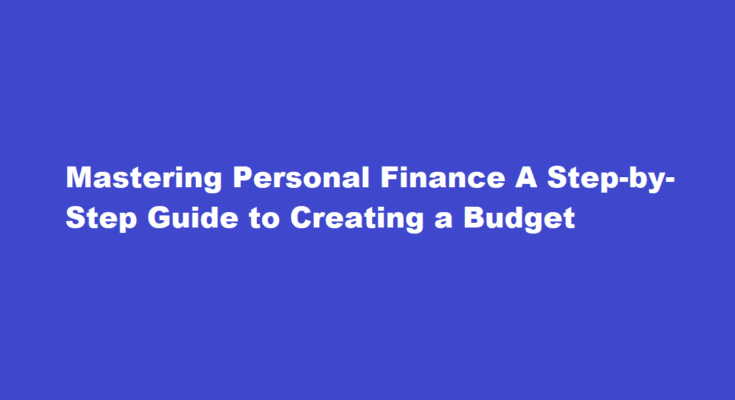Introduction
When it comes to personal finance, creating and sticking to a budget is crucial. A well-designed budget empowers individuals to take control of their financial situation and achieve their financial goals. In this article, we will explore a step-by-step guide to creating an effective budget that helps you manage your money wisely.
Assess Your Financial Situation
Before diving into budgeting, it’s important to have a clear understanding of your current financial situation. Start by calculating your monthly income after taxes. Then, make a comprehensive list of all your monthly expenses, including fixed expenses like rent, utilities, and loan payments, as well as variable expenses such as groceries, transportation, and entertainment. Analyzing your spending habits and financial obligations will provide valuable insights into your financial priorities and identify areas where you can potentially cut back or save.
Set Financial Goals
Next, define your short-term and long-term financial goals. Whether it’s paying off debt, saving for a down payment on a house, or planning for retirement, having specific goals helps you stay motivated and focused. Determine how much money you need to allocate toward each goal and set realistic timelines. Breaking down large goals into smaller milestones will make them more attainable and enable you to track your progress along the way.
Categorize and Prioritize Expenses
To create an effective budget, categorize your expenses into fixed, variable, and discretionary categories. Fixed expenses include recurring bills that remain relatively stable from month to month. Variable expenses fluctuate based on your consumption or usage. Discretionary expenses are non-essential items or activities that can be reduced or eliminated if necessary. Prioritize your spending based on your financial goals, ensuring that essential expenses are covered first before allocating funds for discretionary items.
Determine Income and Expense Allocation
Now it’s time to allocate your income to cover your expenses and savings. Start by subtracting your total expenses from your income. If you have a surplus, consider increasing your savings or investing in areas that align with your long-term financial goals. If you have a deficit, analyze your spending categories to identify areas where you can cut back. Look for ways to reduce unnecessary expenses, negotiate bills, or explore more affordable alternatives.
Track and Adjust Regularly
Budgeting is an ongoing process that requires regular monitoring and adjustment. Use technology tools like budgeting apps or spreadsheets to track your income, expenses, and savings. Compare your actual spending with your budgeted amounts and make adjustments as needed. Be flexible and adapt to changes in your financial circumstances or unexpected expenses. Regularly reviewing your budget helps you stay accountable and make informed financial decisions.
Build an Emergency Fund
One crucial aspect of personal finance is preparing for unforeseen circumstances. Establish an emergency fund to cover unexpected expenses such as medical emergencies or job loss. Aim to save three to six months’ worth of living expenses in a separate account. Start small and gradually increase your contributions over time. An emergency fund provides a safety net, ensuring that you won’t have to rely on credit cards or loans during challenging times.
FREQUENTLY ASKED QUESTIONS
What is a personal financial budget?
More specifically, it is the “amount of money that is available for, required for, or assigned to a particular purpose” (“Definition of BUDGET”, 2021). Basically, a budget is a spending plan that maps out the amount of income versus the amount of expenses during a specific period of time.
What is the 50 20 30 budget rule?
The 50-30-20 rule recommends putting 50% of your money toward needs, 30% toward wants, and 20% toward savings. The savings category also includes money you will need to realize your future goals.
Conclusion
Creating a budget is a fundamental step in managing personal finances effectively. By following these steps, you can gain control over your money, prioritize your financial goals, and make informed spending decisions. Remember, financial success comes from discipline, regular monitoring, and a commitment to aligning your expenses with your values and long-term aspirations.
Read Also : The Art of Baking a Decadent Chocolate Cake from Scratch



